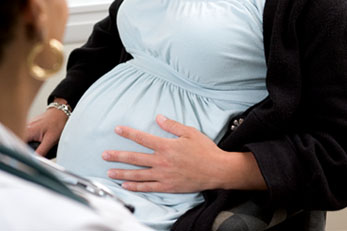Tips for Common Discomforts

As your body adjusts to pregnancy
You may experience some discomforts. Here are some tips for relieving them.
Morning sickness (nausea and vomiting)...
Morning sickness can happen at any time - day or night. If none of the suggestions help, or if vomiting is excessive, tell your provider.
What you can do:
- Get up slowly in the morning. Sit on the side of the bed for a few minutes before standing up
- Eat a few crackers or another light snack before you get out of bed
- Eat five or six small meals each day. Try not to let your stomach get completely empty. Eat foods that smell and taste good to you
- Eat snacks that are high in protein, like nuts and peanut butter
- Drink fluids often during the day. Good choices are broth, cola and Gatorade®
- Get plenty of fresh air
- Avoid smells that are unpleasant
- Don't eat fatty foods or foods that are hard to digest. Don't drink citrus juice, milk, coffee or tea with meals
- Check with your provider before taking any medicine or health food remedies (such as ginger supplements) to relieve nausea
Backache...
What you can do:
- Stand and sit up straight
- Avoid twisting movements
- Don't lift heavy objects
- Get a prenatal back massage
- Sleep on a firm mattress
- Do lower-back exercises
- Ask your provider for a referral to a back-pain specialist if the pain is severe
Constipation...
Constipation is when it's hard to have a bowel movement. It is a common problem during pregnancy.
What you can do:
- Drink six to eight glasses of fluid (water, fruit juice or milk) daily
- Eat high-fiber cereals and large amounts of other whole grains, legumes, fruits and vegetables
- Exercise regularly
- Ask your provider before you take any kind of laxatives
- Eat dried fruit like prunes or dates every day
Heartburn...
You may have heartburn for the first time during pregnancy, especially during the second and third trimesters.
What you can do:
- Eat small, low-fat meals and snacks
- Eat slowly
- Drink fluids mainly between meals, not with meals
- Go easy on spices and acidic fruits and juices
- Wait one to two hours after eating or drinking to lie down, especially before bedtime
- Wear loose-fitting clothing
- Ask your provider if you can take an antacid
Hemorrhoids...
Hemorrhoids are varicose veins in the anus that swell and become painful. To avoid getting them, see tips on how to avoid constipation.
What you can do:
- Soak the rectal area in warm water for ten to twenty minutes several times a day
- Ask your provider about over-the-counter hemorrhoid creams that are safe to use during pregnancy
- Use unscented, white toilet paper. You may find it helpful to wipe the anal area with moist towelettes, wet toilet paper or medicated pads instead of toilet paper
- Keep the anal area clean, but don't use soap. Gently dry the area after bathing
- Apply ice packs or cold compresses for ten minutes, up to four times a day
Varicose veins and swollen legs...
Varicose veins are enlarged veins that are raised above the skin's surface. They can be aggravated by pregnancy.
What you can do:
- Rest with your legs up
- Wear support tights or stockings
Leg cramps...
Leg cramps are probably caused by the need for calcium and potassium.
What you can do:
- Drink more milk, eat more dairy products and foods high in potassium, like bananas
- To ease the pain of a cramp, extend your leg and flex your foot so that your toes come toward your body
Urine leakage...
Urine leakage is caused by the weight of the baby pressing down on your bladder.
What you can do:
- Wear a sanitary pad or panty liner
- Do pelvic exercises (also called Kegel exercises), which strengthen the muscles that control the flow of urine. To do them, squeeze the muscles you use to stop yourself from urinating. Hold the muscles tight for ten seconds then release.
Vaginal discharge...
You may have an increase in vaginal discharge. The discharge should be clear and mucus-like.
What you can do:
- Wash with a non-irritating soap
- Do not douche
- Tell your provider if you see blood or if discharge is excessive, has an unusual or bad odor or causes itching or burning. These could be signs of infection.


